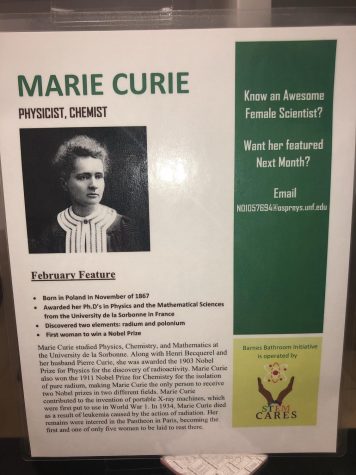The majority of college graduates and master’s level degrees are women and 40 percent of the workforce in the United states are also women, according to the Girl Scout Research Institute. Yet, women only account for 20 percent of degrees that involve engineering, computer science and physics.
Research by GSRI suggests that, out of a survey of 2,894 participants, 52 percent of all girls and 50 percent of all boys are digital leaders due to the increasing accessibility and use of technology among girls.
But if girls tend to score higher in terms of being digital leaders, then why is the amount of women in the STEM fields still low?
Professor of Mechanical Engineering at UNF, Alexandra Schonning, says that research supports a sense of not belonging and low self-confidence as reasons for low numbers when it comes to women joining STEM. Starting at the age of six, young girls seem to think they are not as smart as their male peers.
Although STEM remains male-dominated, universities attempt to change that by encouraging female students to pursue jobs in fields like engineering, mathematical sciences and even social sciences.
“Research indicates that girls tend to go into fields that have direct links to helping people in society, and in engineering we have done a poor job showing the link between helping society and our field,” Schonning said.
“In the field of engineering, we have about 14 percent of women. We need more engineering graduates, period,” Schonning said. “We are already bringing in a large portion of men into the field, but there’s almost like an untapped resource going after the underrepresented gender, women.”
The Society of Women Engineers aims to give women engineers a unique place and voice within the industry, while showing women of all ages the work engineers do in order to solve real world problems and improve quality of life.
“I think the more exposure you have, like when you’re little or when you’re a kid, and knowing what engineering is and knowing that that’s an option for you, knowing that’s what your interest lies in when you are a little girl, then you can kind of steer yourself towards that, to do that and find that passion for it when you’re older” said Vice President of SWE and Civil Engineering major, Summer Bradley.
That’s not all UNF is doing to ensure women join and stay in the STEM field.
The Barnes Bathroom Initiative, which was started last year, pushes to provide free feminine products for female students in STEM in order to make sure they are being supported. Not only does this initiative help put free pads, tampons and things like hair ties in university bathrooms in case of emergencies, it also encourages them by putting up successful and well-known women in STEM each month as a reminder to keep going. The initiative also aims to build up self-esteem, as sticky notes are placed on the sinks where women can encourage other women through inspiring and motivational messages.

As a part of the Barnes Initiative, they post a picture and profile of a women in STEM every month in female restrooms.
“It helps us provide a more diverse thinking environment. We need diverse thinking to really understand what problems we’re going to solve and figure out better solutions to solve them,” said Schonning.
Schonning is currently coordinating a Women Leaders In STEM Conference hosted by The Center For the Advancement of Women in Engineering and the College of Computing, Engineering and Construction. The event will take place Tuesday, March 5, as part of International Women’s Week.
__
For more information or news tips, or if you see an error in this story or have any compliments or concerns, contact editor@unfspinnaker.com.












